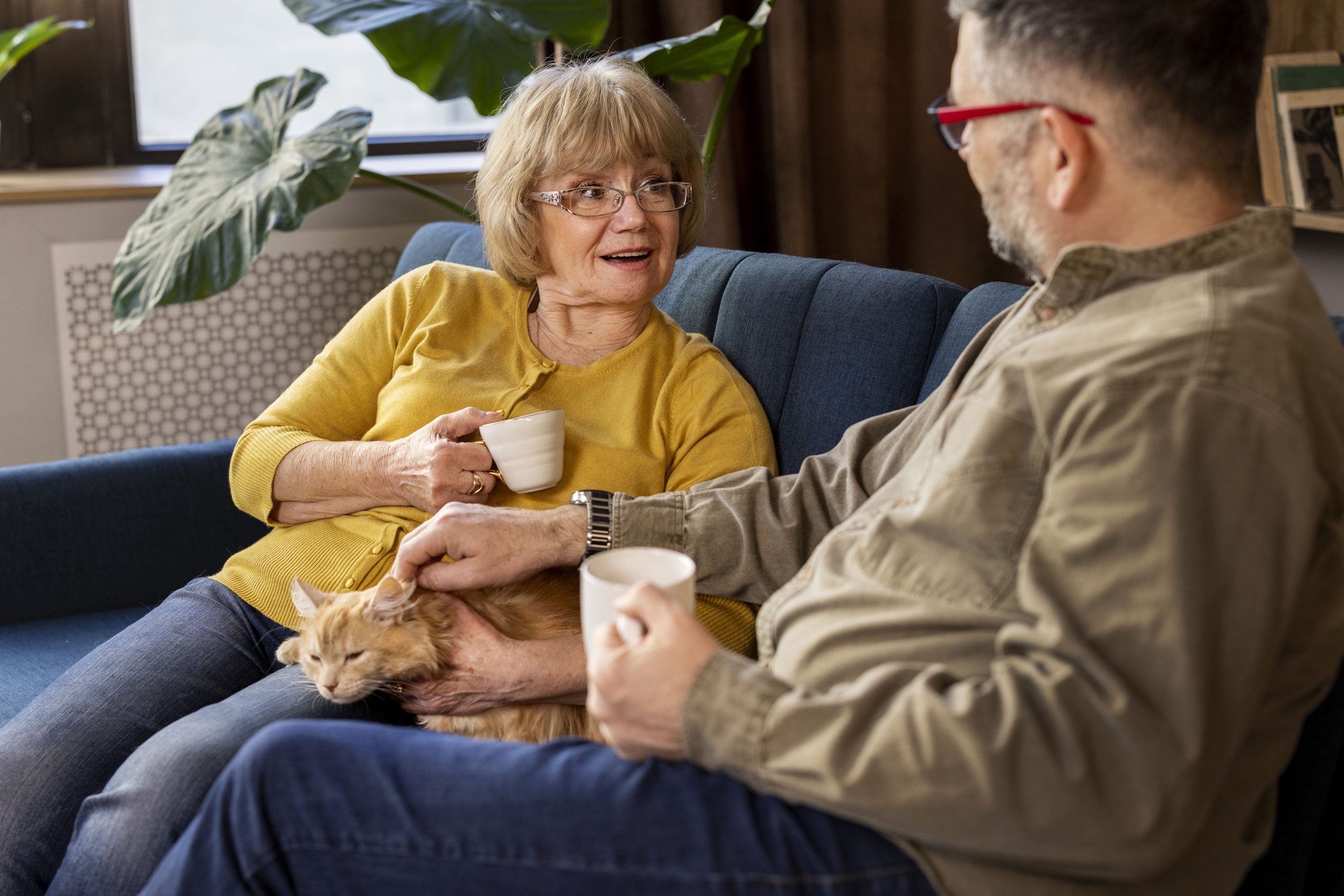Winter can slow the rhythm of daily life. The shorter days and colder air can bring comfort and reflection, yet for many older adults, the season can also reveal subtle shifts in mood, energy or health.
Families often notice these changes first: a reluctance to go outside, skipped meals, a little less conversation, or an untidy corner that was once immaculate. These small signs may hint at something deeper – a need for support, reassurance or renewed engagement.
Recognising them early allows families to respond with sensitivity, ensuring that loved ones remain safe, content and connected through the colder months.
Common Winter Signs an Older Loved One May Be Struggling
Understanding the nuanced cues of decline, whether emotional, cognitive or physical, helps you offer thoughtful support before concerns escalate.
- Withdrawal from social connection
If a loved one who usually enjoys conversation or shared activities begins to isolate themselves, it may be more than a preference for quiet. Winter’s shorter days and reduced sunlight can affect mood and motivation, leading to social withdrawal or mild depression.
- Changes in appetite or eating habits
A diminished appetite, skipped meals or reliance on convenience foods can be early indicators of declining energy, dental discomfort or low mood. Nutrition plays a crucial role in maintaining both physical and emotional health, particularly when the body requires extra warmth and energy in colder weather.
- Disorientation or forgetfulness
Colder months often mean spending more time indoors, which can affect routine and orientation. If a loved one begins missing appointments, repeating questions, or showing signs of confusion, it may be time for a gentle cognitive check or additional daily structure.
- Neglect of personal care or surroundings
If clothing appears soiled, washing is left undone, or household spaces seem unusually disorganised, these may be quiet signals that daily tasks are becoming overwhelming.
- Noticeable changes in movement or posture
Reduced mobility, slower walking pace, or unsteadiness on the stairs can all point to a heightened fall risk. Ice, uneven pavements and limited daylight make winter a particularly challenging season for physical safety.
- Shifts in emotional expression
Irritability, apathy, or a noticeable loss of interest in once-loved activities can be subtle signs of emotional fatigue or loneliness – feelings that often intensify when days grow darker.
Winter Care Tips for Elderly – How to Offer Graceful Support
Supporting an ageing loved one during the colder months calls for attentiveness, warmth, and sensitivity. The aim is to provide care without diminishing independence – to offer reassurance, stability, and comfort in ways that nurture confidence and self-assurance. The following winter care tips for elderly loved ones are designed to bring calm, connection, and wellbeing through the season.
- Begin with gentle conversation
Approach with kindness and curiosity rather than concern. You might say,“I’ve noticed you seem a little quieter lately, how are you feeling?” Simple questions can open dialogue and make your loved one feel heard.
- Create warmth through routine
Structure brings comfort, especially during the darker months. Encourage regular mealtimes, daily light exposure and engaging activities that bring rhythm and joy. Even small gesturessuch as sharing a mid-morning cup of tea or walking to the garden together can anchor the day.
- Introduce moments of sensory enrichment
Warmth, scent and texture have powerful effects on wellbeing. Light a softly fragranced candle, play favourite music, or enjoy hand massages with nourishing oils. Sensory rituals awaken comfort and presence, particularly for those living with memory loss.
- Support physical wellbeing
Encourage light exercise such as stretching or gentle indoor movement to support circulation and flexibility. Ensure living spaces are warm, clutter-free and well-lit, with essentials close at hand to reduce strain. The UK Government also emphasises the importance of keeping warm and maintaining a safe, well-heated home in winter, noting that warmth, light and good daily routines play a key role in supporting health and wellbeing during colder months.
- Keep nutrition front of mind
Warm, nourishing meals are vital in winter. If cooking feels too demanding, explore ready-to-serve healthy options or arrange for a meal service. Loveday’s chefs, for instance, create seasonal menus designed to energise and delight, turning nourishment into a daily pleasure.
- Seek professional insight early
If changes persist or intensify, consider consulting a GP or care specialist for a review. Early intervention can make a remarkable difference, allowing for discreet adjustments before issues become serious.
A Season for Connection and Calm
These winter care tips for elderly loved ones are rooted in presence and intention. Small, thoughtful actions can transform the colder months into a time of renewal and reassurance. With mindful conversation, sensory comfort and gentle structure, families can ensure their loved ones feel supported and secure, while preserving autonomy and joy in daily living.
Emotional Awareness in Family Care
It’s natural to feel uncertain when noticing changes in a loved one. Many families hesitate to step in for fear of overstepping boundaries. Yet small, thoughtful gestures often provide the greatest reassurance – a phone call, shared laughter or a quiet afternoon spent together.
Emotional support need not be grand; it simply requires presence. Consistency and gentle engagement communicate security, helping older adults feel anchored during a season that can otherwise feel isolating.
Loveday’s care philosophy places equal emphasis on emotional and physical wellbeing, recognising that confidence, joy and connection are as essential as medical attention. Through music, art, culinary enjoyment and sensory therapies, Members experience a daily rhythm that nurtures both body and mind.
Knowing When to Seek Extra Support
Winter can be a pivotal time for assessing whether home support remains sufficient. If caring responsibilities begin to feel overwhelming, or if your loved one would benefit from more structured engagement, it may be time to explore professional assistance.
Loveday’s Day Club and respite services are designed to provide exactly that: balance, relief and continuity. Families can rest assured knowing their loved one is surrounded by expert carers, enjoying enriching activities, chef-prepared meals and the companionship of others in beautifully curated surroundings.
These services allow families to step back temporarily without worry, ensuring that care remains consistent and enriching throughout the season.
A Season for Awareness and Connection
Winter may present challenges, but it also brings opportunities – moments to pause, observe, celebrate and reconnect. By recognising subtle shifts and responding with sensitivity, families can help loved ones remain emotionally and physically well through the colder months.
At Loveday, we understand that exceptional care begins with awareness. Our expert teams are trained to notice the smallest changes, which may include a change in expression, appetite, or tone and respond with tailored, thoughtful support.
Discover Thoughtful Support This Winter
If you’re caring for an ageing parent or loved one and have noticed subtle changes this winter, Loveday’s Day Club and respite services offer expert guidance and support in an environment designed for comfort, engagement and joy.
Experience how our holistic approach to wellbeing transforms the winter months into a season of warmth and renewed connection.
Contact Loveday to arrange a visit or learn more about our tailored care options.



